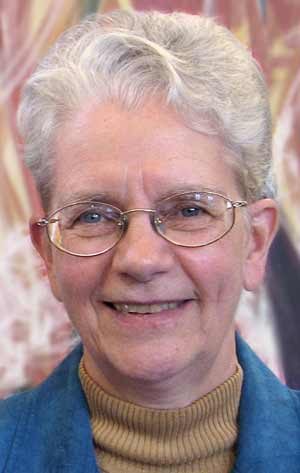 Franciscan Sr. Florence DeaconGARDEN GROVE, Calif. –– Franciscan Sr. Florence Deacon is the new president of the Leadership Conference of Women Religious, elected at the closing of the organization’s Aug. 9-12 annual assembly where members described themselves as “contemplative activists.”
Franciscan Sr. Florence DeaconGARDEN GROVE, Calif. –– Franciscan Sr. Florence Deacon is the new president of the Leadership Conference of Women Religious, elected at the closing of the organization’s Aug. 9-12 annual assembly where members described themselves as “contemplative activists.”
Sr. Deacon, director of her St. Francis, Wis.-based congregation, has represented Franciscans at the United Nations and around the world, including as director of the New York office of Franciscan International. She has been an LCWR leader for the past 10 years at the regional and national levels.
According to organizers and participants at previous conventions, this year’s assembly drew a wider variety of congregations’ representatives from across the country, with a predominant number from the East Coast.
But attendees concluded that decreasing membership in a large number of religious communities requires a review of LCWR’s regional structure.
A survey conducted by the organization’s Strategic Operational Planning Committee projected that by 2012 there will be at least 100 fewer women religious in each region. Currently, there are a total of 46,451 women consecrated to religious life in the country, down from 60,642 in 2007.
A conversation between two members of LCWR’s Contemporary Life Committee yielded some conclusions about “three movements” that have developed within the organization.
They are: an energy that promotes a different way of understanding how to let go and embrace “a new way”; an urgency to be with the world in ways “we are transforming”; and embracing change, being willing to put everything on the table for the “sake of realigning it in service for God’s mission in the world with complete selflessness.”
The sisters compared the event with a “reflection seen through a mirror” and concluded that the discussions were done “in partnership with God, who lies in labor giving birth all day long.”
To describe the attitude in the room, the sisters used words such as “hope-filled,” “sturdy strength,” a “sense of peace, but not quietness,” determination, purpose, unity, fearlessness, “less impatient,” “less desperate” and “new lightness of being.”
The women religious admitted there is still an increasing need for solidarity, communion and partnership among them.
In talking about the future of LCWR and its membership, past president Dominican Sr. Mary Hughes drew on the examples of saints who endured suffering and oppression but conveyed a message of reconciliation and forgiveness.
“Forgiveness emanates from freedom,” she said, “from tapping into a wellspring of compassion and it never pretends that all is well.”
She offered four conditions that give way to forgiveness: having a willingness to abandon the right to resentment; seeking not revenge but reconciliation; letting go of hoping for a better past; and letting go of negative attachment to hurt.
The assembly stage was set up like a living room for “reflective presentations” and unlike previous assemblies, no rally was held this year. It was replaced by an immigration prayer and panel with lay activists who talked about, among other issues, the struggles of undocumented immigrant and their families forced to live in the shadows or facing deportation.
Their presentation offered an illustration of the prior day’s keynote speech, which for the first time was delivered in another language, rather than English. A woman religious from Mexico gave the address in Spanish.
“Your contributions to theology and spirituality have favored Latin America and Caribbean countries,” said Benedictine Sr. Maricarmen Bracamontes, coordinator of a theology advisory team to the Latin American and Caribbean Confederation of Religious, which includes men and women religious.
Her religious community is based in the northeastern Mexican state of Coahuila, which shares a border with Texas and is an area that has become a fertile field for organized crime.
“The apostolic visitation had to do with your intellectual formation in different areas and your involvement in civil organizations that has increased our respect towards you,” said the Mexican theologian.
After offering differences and similarities in the way of doing things in the United States and in Latin American countries, Sr. Bracamontes stressed on the need of increased solidarity for growth and maturity.
“We live in crucial times in every sense of the word,” she said, “we must not, we cannot turn back, we have to follow God’s dream in terms of values, relationships, institutions and systems. We have to question ways of facing problems and how to respond,” she stated.
She stressed the importance of using the “Christian memory” when reviewing and interpreting current events, keeping in mind what was significant in the past that could be used in the present.
“Efforts to understand events from a Christian perspective are key for pastoral action,” she remarked. “We are called to activate the memory of life, death and resurrection of Jesus.” She invited participants to “roll away the stone” to nourish growth and maturity and “confront the evil.”
“There is power in Jesus as a creator and re-creator of life that helps develop a healthy growth to reach a fullness of life; a source of being and life. It’s not to impose or force dominion or leadership, but rather develop creative capacity.”
She left participants with a question for further discussion: How to be active participants in this paradigm shift as a main source of strength?
The 2012 LCWR national assembly will be held in St. Louis.
